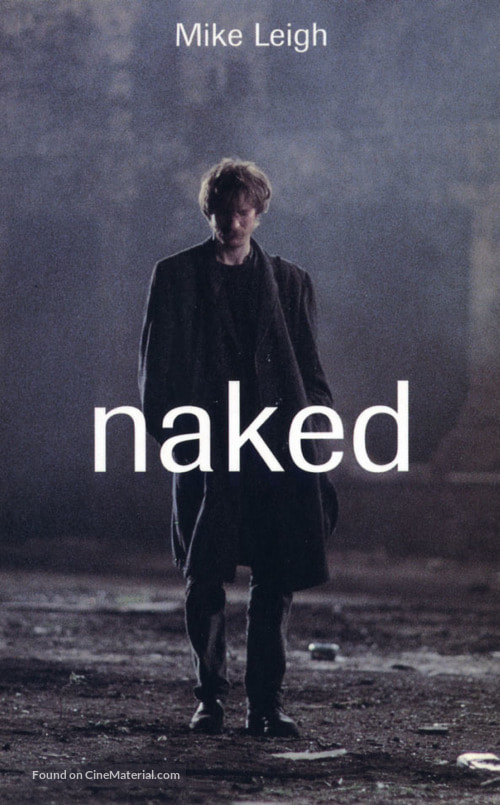I classify Mike Leigh's 1993 film Naked as one of those I hate liking. When I saw the film for the first time shortly after its release, I distinctly remember harboring a favorable impression of it as I was leaving the movie theater, but this acclamatory assessment was simultaneously tempered by a sense of deep revulsion. Though it was an odd sensation to experience, I was not at all surprised by this contradictory response. Though I enjoyed the brilliant acting, clever screenwriting, and effective cinematography, I was repulsed by the world Mike Leigh depicts in the film.
The nausea I experienced did not stem from any gratuitousness or insincerity on Leigh's part, but rather from an acknowledgement of the film's jolting and accurate depiction of contemporary nihilism, alienation, loneliness, and despair. The spiritual darkness and hopelessness Leigh presents is extremely cutting and relevant, and I suspect this underlying darkness and hopelessness has only grown darker and more hopeless in the twenty-seven years since the film's release.
Whether exposure to darkness can help guide one toward the light is questionable. At the same time, being oblivious to the spiritual murk that masquerades as modern society probably does more harm than good in terms of recognizing and remaining in the light. Of course, Leigh offers the viewer very little in the way of light in this film. Cinematographically, the vast majority of the scenes are draped in inky tones of night and shadow; and the daytimes scenes are burdened by diffused, oppressive grayness utterly unblessed by even the slightest ray of sunshine. The locations feel cramped and closed, creating a sense of physical and metaphysical claustrophobia - tight stairwells, narrow alleyways, decaying stretches of urban wasteland. Whatever slivers of metaphysical light manage to penetrate the shadows are quickly eclipsed by the shadows of hopelessness.
The characters themselves exist in a vicious world of predator and prey. Most appear lost and zombified. Grounded in crushing materialism, they are, nonetheless, completely disconnected from the physical places they refer to as homes; unaware and unattached to any of the objects surrounding them. All are starved for love and authentic human connection, yet their attempts to attain these ultimately makes them either victims or victimizers. Johnny, the Mancunian main character, rips through this depressing ensemble of soul-wounded characters like a hurricane. Intellectual and intense, this loquacious, failed-Romantic anti-hero possesses enough perspicacity to pierce through the lies and listlessness of the modern world, but his overreliance on his intellect ultimately leads him into a metaphysical dead end.
Convinced humanity is merely a stage in the evolutionary ladder toward the eventual appearance of form of theosis in the guise of pure, God-like consciousness, Johnny finds no meaning or purpose for contemporary human life outside of this evolutionary role. Put another way, humanity's sole purpose is to prepare the way for an eventual higher form of being - a higher form of being in which humanity's only creative role is to passively live out its own determined, physical existence until the coming of the apocalypse, which will usher in the beginning of the next stage of evolution toward pure consciousness.
The inherent hopelessness of these metaphysical assumptions bleed into the whole film and are reflected by every downcast, deprived, and derelict character Johnny encounters on his pseudo Odyssey around London. Of course, the very notion of metaphysical assumptions are beyond the scope of most of the people Johnny meets, with the only exception being Brian, the middle-aged security guard who grants Johnny a few hours of reprieve from the cold and damp London night. Working in what Johnny describes as 'the most tedious job in England', Brian guards an empty building and spends the majority of each night contemplating the future while the city around him sleeps. Convinced his life has meaning, and that this meaning resides somewhere in the future, Brian ultimately rejects the hopelessness Johnny describes in a memorable metaphysical tirade laced with conspiratorial flourishes.
Over breakfast at a café the following morning, Brian quietly gives Johnny the advice the younger man so sorely needs. Don't waste your life. The words fall on deaf ears, for as far as Johnny is concerned life is already a waste. Thinking a waste cannot be wasted amounts to nothing more than wishful thinking in his mind.
The scene below contains the metaphysical tirade mentioned above. As far as I'm concerned, it's an excellent scene, even if the message it presents is anything but.
Warning: The clip below contains a fair bit of swearing.


 RSS Feed
RSS Feed

